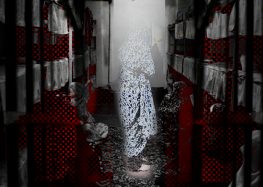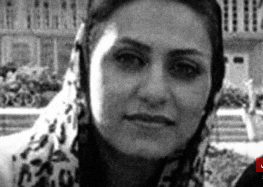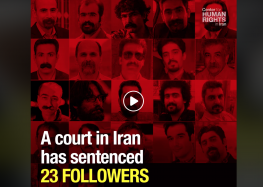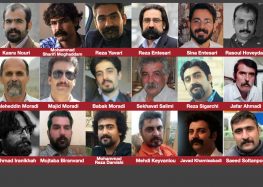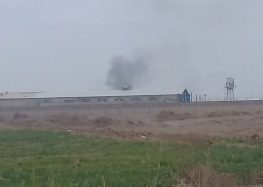Sufi Detainees Tried En Masse in Iran as Some Launch Hunger Strike Against Denial of Due Process
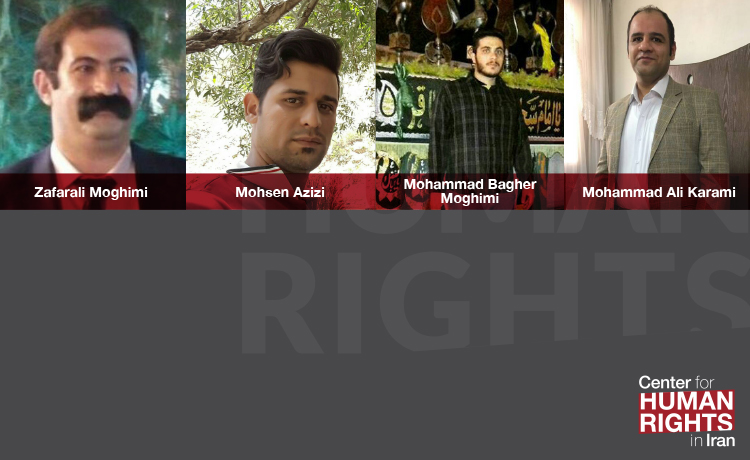 Eight detained members of the Sufi Gonabadi Order have gone on hunger strike at the Great Tehran Penitentiary (GTP) to protest prison conditions and the state’s ongoing restrictions on the leader of their faith.
Eight detained members of the Sufi Gonabadi Order have gone on hunger strike at the Great Tehran Penitentiary (GTP) to protest prison conditions and the state’s ongoing restrictions on the leader of their faith.
The detainees who are refusing food are Mohammad Ali Karami, Mostafa Shirazian, Zafarali Moghimi, Mohsen Azizi,Hossein Fahimi, Mohammad Bagher Moghimi, Alireza Ghasemi and Hossein Hashemi.
“Among the hunger strikers Zafarali Moghimi is in serious condition and Mohammad Ali Karami is experiencing problems because he has a heart condition,” Niloufar Dowlatshah, the wife of hunger striker Mohsen Azizi, told the Center for Human Rights in Iran (CHRI) on June 11, 2018.
Dowlatshah added that Moghimi’s condition is of particular concern because he has been on hunger strike for 65 days.
The mass hunger strike is taking place as an estimated 300 Sufis who were arrested in a clash between dervishes and police and security forces in Tehran February 19th-20th, 2018, are being tried in groups by Branch 15 of the Revolutionary Court presided by Judge Abolqasem Salavati and Branch 26 of the Revolutionary Court presided by Judge Mashallah Ahmadzadeh.
Both judges are known for issuing harsh sentences in cases involving defendants facing politically motivated charges.
“So far, verdicts have been issued against 60 of them,” Dowlatshah told CHRI. “The sentences include multiple years in prison, flogging, travel bans and exile.”
“All the dervishes have been charged with ‘disturbing public order’ and ‘assembly and collusion against national security,’” she said. “Some of them have also been charged with carrying different kinds of weapons. In recent days, seven dervishes per day were sent to the Revolutionary Court to face trial without their lawyers present.”
“The families of the detained dervishes have chosen 14 lawyers but none of them have been able to see their clients or study the cases or defend them on the days of their trials,” Dowlatshah added. “We have been explicitly told that the defendants do not have the right to a lawyer because they are facing national security charges.”
Dowlatshah continued: “But the dervishes are not political. What they have done is not a security crime. All they did was protest the police’s siege of their leader Nour Ali Tabandeh’s home. They gathered in front [of his home] to call for an end to the restrictions against him and demanded the release of some of their fellow dervishes from detention.”
Dowlatshah said her husband Mohsen Azizi was tried on June 3 at Branch 26 of the Revolutionary Court for the charges of “assembly and collusion against national security” but that his lawyer was prevented from entering the courtroom. Judge Ahmadzadeh said he would issue a verdict in 20 days.
The dervishes were arrested during their protest in Tehran after police opened fire on them while they were demanding the release of a detained follower at the police station in the Golestan St. neighborhood of Tehran, sending some 170 dervishes to the hospital according to Sufi reports.
At least one of them—Mohammad Raji, a former commander of the Islamic Revolutionary Guard Corps and Iran-Iraq war veteran—died in custody.
Three policemen also died after a bus allegedly driven by a dervish ran over them.
The alleged driver Mohammad Salas was sentenced to death for the deaths despite insisting that he was tortured in custody and forced to make a confession.
“All the dervishes who were arrested on the night of February 19 and the following morning were severely beaten,” Dowlatshah told CHRI. “My husband’s nose was broken when he was struck with a baton in detention.
“They sent him to prison without getting stitched and that left a scar on his head and his nose became crooked,” she added. “All of them were in such a bad condition that we were not allowed to visit them for a month and a half.”
According to Dowlatshah, the detainees have been forced to sleep on the floor and buy bottled water (piped water is not drinkable in the GTP) from the prison commissary at two or three times higher than the retail price.
“Their families had agreed to collect some money and buy some medicine, air conditioners and hygienic products for the detainees but the prison officials have refused to deliver any of them,” she said.

